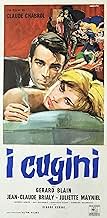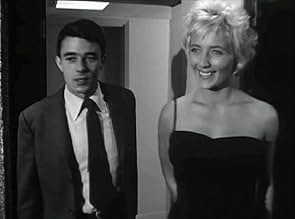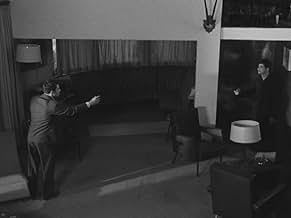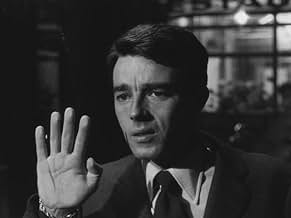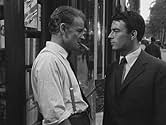IMDb रेटिंग
7.2/10
3.4 हज़ार
आपकी रेटिंग
अपनी भाषा में प्लॉट जोड़ेंA pair of cousins share a flat, but animosity begins to build between the two when a woman gets involved.A pair of cousins share a flat, but animosity begins to build between the two when a woman gets involved.A pair of cousins share a flat, but animosity begins to build between the two when a woman gets involved.
- निर्देशक
- लेखक
- स्टार
- पुरस्कार
- कुल 1 जीत
फ़ीचर्ड समीक्षाएं
Chabrol's second feature. I haven't seen his first, Le beau Serge, but this is the most French New Wave film I've seen from Chabrol. As such, it's by far my favorite. I like several of his films, but I do find even my favorites a little dry. This one is just gorgeous and it's quite a lot of fun throughout. Gerard Blain plays a provincial who is moving to Paris to go to college. He moves in with his cousin (Jean-Claude Brialy), who is himself a student. Brialy is a total party animal, spending all his free time drinking with friends and none of it studying. The two get along at first, but then a woman (Juliette Mayniel) comes between them. The film is kind of a precursor to Jules et Jim.
This film by Claude Chabrol reminds me of the old story of the country mouse and the city mouse. The country mouse is excited to see the big city but his bumbling provincial ways are out of step with his more sophisticated city cousin. This seems to be pretty much the basis for this film, "Les Cousins"! Though of course, being a Chabrol film it will have some dark edges and twists!
Charles is the guy raised in the country. He's slow and lacks confidence with women. Paul, on the other hand, was raised in the city and women hang all over him and put out like crazy for him. When Charles comes to stay with him while he goes to college, he is quite the contrast to Paul who is a confident ladies' man. He's also more bookish and introspective than Paul. All Paul wants is to have a good time and have sex--and he couldn't care less about his studies at the college. And, in a way, Paul has contempt for his cousin when Charles falls head over heels for Florence--and he soon beds Florence and asks her to move in with him. As for Charles, he is sad but sinks his energy into his classwork and tries to do the right thing. What's next for this odd mismatched pair? Bet you won't be able to guess!
This film is considered by many to be one of the best and earliest New Wave films. Like many New Wave movies, the normal film formulas are turned on their head and goodness isn't necessarily rewarded and the ending is quite ambiguous. Well worth seeing and darkly enjoyable.
Charles is the guy raised in the country. He's slow and lacks confidence with women. Paul, on the other hand, was raised in the city and women hang all over him and put out like crazy for him. When Charles comes to stay with him while he goes to college, he is quite the contrast to Paul who is a confident ladies' man. He's also more bookish and introspective than Paul. All Paul wants is to have a good time and have sex--and he couldn't care less about his studies at the college. And, in a way, Paul has contempt for his cousin when Charles falls head over heels for Florence--and he soon beds Florence and asks her to move in with him. As for Charles, he is sad but sinks his energy into his classwork and tries to do the right thing. What's next for this odd mismatched pair? Bet you won't be able to guess!
This film is considered by many to be one of the best and earliest New Wave films. Like many New Wave movies, the normal film formulas are turned on their head and goodness isn't necessarily rewarded and the ending is quite ambiguous. Well worth seeing and darkly enjoyable.
Charles is a young provincial coming up to Paris to study law. He shares his cousin Paul's flat. Paul is a kind of decadent boy, a disillusioned pleasure-seeker, always dragging along with other idles, while Charles is a plodding, naive and honest man. He fell in love with Florence, one of Paul's acquaintances. But how will Paul react to that attempt to build a real love relationship?
Of the so-called French New Wave directors, Claude Chabrol has been called possibly the most mainstream (though less celebrated than Truffaut or Godard). We could also say he has a remarkable amount of stamina. "Les Cousins" was at the beginning of his career, and for decades he kept making great movies, including the notable "Madame Bovary" in 1991... and still kept going.
I love this film's blend of decadence and death. A simple man, with studies on his mind, is exposed to some bizarre scenes of sensuality, violence, crime, and even Nazi elements (in 1950s France?). This is what it is like if you take two opposing elements and allow them to spin out of control.
Of the so-called French New Wave directors, Claude Chabrol has been called possibly the most mainstream (though less celebrated than Truffaut or Godard). We could also say he has a remarkable amount of stamina. "Les Cousins" was at the beginning of his career, and for decades he kept making great movies, including the notable "Madame Bovary" in 1991... and still kept going.
I love this film's blend of decadence and death. A simple man, with studies on his mind, is exposed to some bizarre scenes of sensuality, violence, crime, and even Nazi elements (in 1950s France?). This is what it is like if you take two opposing elements and allow them to spin out of control.
Les Cousins is definitively part of the French New Wave of the late 1950s. Whilst slightly more polished than the films of his contemporaries (notably Godard and Truffaut), Chabrol's film bubbles with an insurgence of new cinematographic techniques and fresh acting talent. The sense of newness is reinforced by presence of so many young actors, dressed elegantly in tuxedos and evening dresses, but acting somewhat delinquently for the most part. The film appears almost like the christening party for the birth of a new era in French cinema.
Both the direction and photography are of a high calibre and capture very well the changing mood of the central character, Charles. The film starts cheerfully and optimistically with the young man's arrival in Paris. Like him, we are enchanted by the bright lights, the wide boulevards and the historic monuments. But then, little by little, the mood changes to ennui and disappointment when the shallowness of the Paris jet set is revealed. Finally, a much darker mood prevails as Charles' best efforts to succeed are brutally crushed by a combination of circumstances, partly of his own making but largely as a result of the hand of fate. This ability to alter the mood of the film so subtly and effectively is one of Chabrol's great skills as a director and is used to far greater effect in some of his subsequent thrillers.
Both of the two central characters, Charles and Paul, are played admirably by Gérard Blain and Jean-Claude Brialy. Blain manages to capture the innocence of the outsider and offers a sympathetic and memorable performance. Brialy seems to revel in his role as the extravagant city student, hosting his parties with the gusto of a true bon-vivant, whilst exhibiting a more complicated and sensitive persona in his conversations with the characters Charles and Florence.
Both actors were used by Chabrol in an earlier film, Le Beau Serge, which, in some ways, is the mirror image of Les Cousins. In Le Beau Serge, Brialy played a city boy who returns to his home in a provincial town where he met up wih a childhood friend played by Blain. Brialy's character was the outsider and ultimately he was destroyed by his alien surroundings. In Les Cousins, the situation is cleverly reversed. Here, Blain's character is a country boy who joins Brialy in the city of Paris. It is Blain's character who is now the outsider, and who is finally destroyed by his unfamiliar environment. It is interesting to watch the two films back-to-back, to note the similarities and compare the differences. Both films seem to side with the outsider and condemn the society that rejects him, although it is perhaps disappointing that, in both cases, that the outsider is destroyed without having any significant impact on the society that crushed him. At least, in Le Beau Serge, the victim's fate was sealed by an altruistic desire to do some good for the community that rejected him, whereas in Les Cousins, the victim brought his destruction on himself by trying to attack the society he felt so repulsive.
Les Cousins lacks the emotional intensity of Le Beau Serge and appears in some places a little too stage-managed. (The ending is particularly stagy, but it works perfectly to the film's advantage.) On the plus side, Les Cousins benefits from a far superior musical score, a more interesting set of characters, and some impressive location filming in Paris. It is an engaging and accessible film which still appears fresh and vibrant.
Both the direction and photography are of a high calibre and capture very well the changing mood of the central character, Charles. The film starts cheerfully and optimistically with the young man's arrival in Paris. Like him, we are enchanted by the bright lights, the wide boulevards and the historic monuments. But then, little by little, the mood changes to ennui and disappointment when the shallowness of the Paris jet set is revealed. Finally, a much darker mood prevails as Charles' best efforts to succeed are brutally crushed by a combination of circumstances, partly of his own making but largely as a result of the hand of fate. This ability to alter the mood of the film so subtly and effectively is one of Chabrol's great skills as a director and is used to far greater effect in some of his subsequent thrillers.
Both of the two central characters, Charles and Paul, are played admirably by Gérard Blain and Jean-Claude Brialy. Blain manages to capture the innocence of the outsider and offers a sympathetic and memorable performance. Brialy seems to revel in his role as the extravagant city student, hosting his parties with the gusto of a true bon-vivant, whilst exhibiting a more complicated and sensitive persona in his conversations with the characters Charles and Florence.
Both actors were used by Chabrol in an earlier film, Le Beau Serge, which, in some ways, is the mirror image of Les Cousins. In Le Beau Serge, Brialy played a city boy who returns to his home in a provincial town where he met up wih a childhood friend played by Blain. Brialy's character was the outsider and ultimately he was destroyed by his alien surroundings. In Les Cousins, the situation is cleverly reversed. Here, Blain's character is a country boy who joins Brialy in the city of Paris. It is Blain's character who is now the outsider, and who is finally destroyed by his unfamiliar environment. It is interesting to watch the two films back-to-back, to note the similarities and compare the differences. Both films seem to side with the outsider and condemn the society that rejects him, although it is perhaps disappointing that, in both cases, that the outsider is destroyed without having any significant impact on the society that crushed him. At least, in Le Beau Serge, the victim's fate was sealed by an altruistic desire to do some good for the community that rejected him, whereas in Les Cousins, the victim brought his destruction on himself by trying to attack the society he felt so repulsive.
Les Cousins lacks the emotional intensity of Le Beau Serge and appears in some places a little too stage-managed. (The ending is particularly stagy, but it works perfectly to the film's advantage.) On the plus side, Les Cousins benefits from a far superior musical score, a more interesting set of characters, and some impressive location filming in Paris. It is an engaging and accessible film which still appears fresh and vibrant.
Chabrol before he truly became Chabrol. This might seem to be one of his more 'realistic' films, with its obligatory nouvelle vague scene of Parisian freewheeling, but one of 'Les Cousins'' main themes is the disparity between reality and fantasy, and the fate of those who cannot tell between them. Just as paul turns his personality into a series of roles, his life into ritualistic tableaux, so Chabrol suffuses his realistic narrative with references to myth, fable, fairy tale, opera, and, especially, film.
'Les Cousins' plays like a counterpart to Melville's 'Les Enfants Terribles', with the same theatricality, claustrophobia, incestuousness, and mythological base; the same cinematographer, even one of Melville's actors! most interesting is the development of Chabrol's style, the lockjaw camerawork, the complex use of point of view, the puncturing of solemnity with incongruous humour (see especially the hilarious 'fish' scene).
'Les Cousins' plays like a counterpart to Melville's 'Les Enfants Terribles', with the same theatricality, claustrophobia, incestuousness, and mythological base; the same cinematographer, even one of Melville's actors! most interesting is the development of Chabrol's style, the lockjaw camerawork, the complex use of point of view, the puncturing of solemnity with incongruous humour (see especially the hilarious 'fish' scene).
क्या आपको पता है
- ट्रिवियाLes cousins (1959) was originally intended to be Claude Chabrol's first film as a director. However, due to its Paris setting, the movie would have been more expensive to shoot. Chabrol decided to make Le beau Serge (1958) first instead since it was made on a smaller budget, and then shot 'Les cousins' afterwards.
- भाव
Le libraire: Read Dostoyevsky. He addresses all your concerns.
- कनेक्शनFeatured in Fejezetek a film történetéböl: A francia új hullám (1990)
- साउंडट्रैक40e Symphonie en Sol Majeur (Koechel 550) 1er movement
Music by Wolfgang Amadeus Mozart (as W.A. Mozart)
Performed by London Symphony Orchestra (as Orchestre Symphonique de Londres)
Conducted by Josef Krips (as Joseph Krips)
Disque DECCA
टॉप पसंद
रेटिंग देने के लिए साइन-इन करें और वैयक्तिकृत सुझावों के लिए वॉचलिस्ट करें
- How long is The Cousins?Alexa द्वारा संचालित
विवरण
बॉक्स ऑफ़िस
- बजट
- FRF 60,00,000(अनुमानित)
- चलने की अवधि
- 1 घं 52 मि(112 min)
- रंग
- ध्वनि मिश्रण
- पक्ष अनुपात
- 1.37 : 1
इस पेज में योगदान दें
किसी बदलाव का सुझाव दें या अनुपलब्ध कॉन्टेंट जोड़ें

